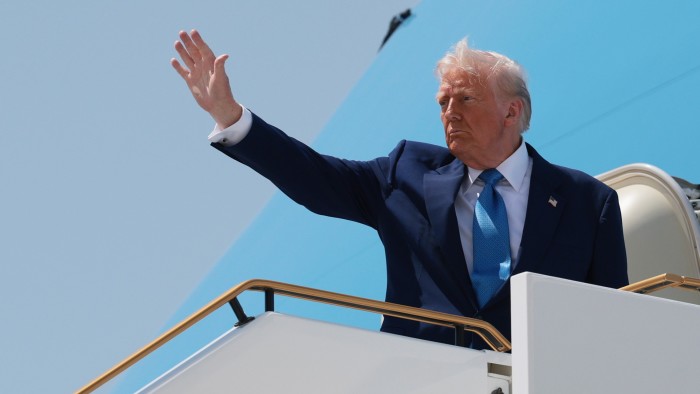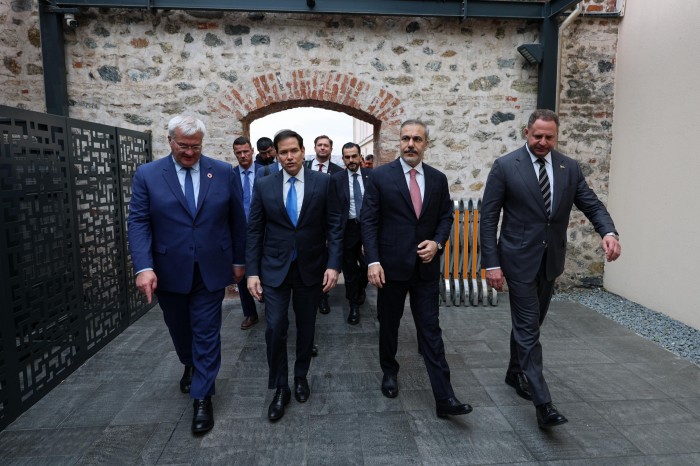What Democrats can learn from Trump’s approach to the Middle East

Unlock the White House Watch newsletter for free
Your guide to what Trump’s second term means for Washington, business and the world
The writer was assistant secretary of state for European and Eurasian affairs during the Obama administration
It is fair to say that Donald Trump does not have a lot of fans in Democratic foreign policy circles, and rightly so. The US president’s chaotic approach to issues, lack of historical knowledge, appointments of craven loyalists to senior policymaking positions and apparent affinity for dictators are rightly the object of criticism and scorn.
But there is one area where many Democrats grudgingly envy Trump: his ability to take on established orthodoxies without paying a political price.
Whereas Democratic leaders fear political backlash when they contemplate breaking new ground, Trump seems to relish it. And his willingness to ignore convention has been on full display this week during his trip to the Middle East.
The first example is the fact of the trip itself. Whereas newly inaugurated US presidents almost always make their first trips to key allies in Europe and North America, Trump has (after a brief stop in Rome for the pope’s funeral) smashed that tradition by going to Saudi Arabia (as he did in 2017).
Indifferent to allied sensibilities or concerns from within his party about democracy and human rights, Trump used that platform to announce major defence sales and investments in the US — popular moves at home. He easily brushed off potential criticism (which President Barack Obama faced in 2009) for travelling to Arab states without stopping in Israel.
Israel policy is another example. Trump has taken positions that show “daylight” with Israel in ways that his predecessors — certainly including Joe Biden — would not have contemplated for fear of creating a political firestorm and congressional opposition. He negotiated directly with Hamas, securing the release of an American hostage. He ended a bombing campaign of the Houthis in Yemen without securing their agreement to stop shooting missiles at Israel. He is negotiating directly with Iran about a nuclear deal that Israel strongly opposes. And he is reportedly talking to Saudi Arabia about bilateral agreements that Israel only wants the US to offer in exchange for an Israeli-Saudi normalisation deal.
There is something to be said for all these steps. But if Biden had pursued them he would be likely to have faced massive opposition — from his own party and probably Trump himself.
And then there was Trump’s agreement to lift sanctions on Syria and meet its new president, Ahmed al-Sharaa. Sharaa is a former jihadist who was once held in an American prison in Iraq and had a $10mn US bounty on his head. His organisation, now known as Hay’at Tahrir al-Sham, was the poster child for Islamist terrorism and designated by the US as a foreign terrorist organisation. After HTS took over Syria by ousting Bashar al-Assad in late 2024, the US maintained that designation and other sanctions while waiting for proof that Sharaa had genuinely abandoned his terrorist past. But Trump broke with that policy, announcing the lifting of US sanctions to great fanfare in Riyadh.
A Democratic president might have worried about sitting down with a former Islamist terrorist who does not recognise Israel and has still to prove his commitment to democracy and human rights. But Trump was right to brush off such concerns, given the opportunity to steer Syria away from its erstwhile Iranian and Russian allies.
Perhaps the most consequential test of Trump’s approach may emerge from the nuclear talks with Iran — now taking place directly in another break with recent practice. Trump may or may not ultimately agree to a nuclear agreement similar to Obama’s 2015 deal, but the one thing that is certain is that if he does he will be able to sell it to his party and Congress in a way that Biden never could have.
Democrats will obviously not want to flout all the same conventions as Trump — certainly accepting a $400mn Qatari plane in violation of the constitution and calling for the US to depopulate and take over Gaza would not be on the list. And unlike Trump, Democrats are not likely to have total control over their party or Congress anytime soon.
But when it comes to the willingness to challenge conventional wisdom and political obstacles in pursuit of foreign policy goals, there is something Democrats could learn from. Americans appreciate confidence and authenticity, even when they may not agree with the specific policy in question. On foreign policy, Democrats might not have the same degree of political flexibility as Trump, but they probably have more than they think.








